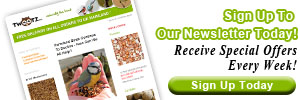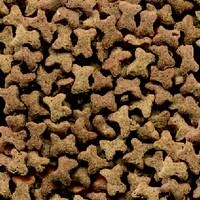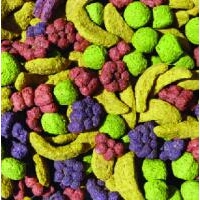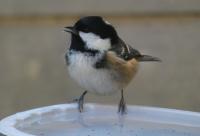- Home
- Special Offers
- New Products
- FAQs
- Customer Video Gallery
- Customer Photo Gallery
- Bird Facts
- Bird Food Blog
- Bird Information
- Feeding Advice
- Small Animal Information
- A to Z of Guinea Pigs
- A to Z of Hamsters
- A to Z of Rabbits
- Basic Care for Guinea Pigs
- Basic Care for Hamsters
- Basic Care for Rabbits
- Basic care for Chinchillas
- Basic care for Ferrets
- Basic care for Gerbils
- Basic care for Mice
- Basic care for Rats
- Buying a Healthy Small Animal
- Does your Reptile need a Licence
- Equipment for Ferrets
- Equipment for Hamsters
- Equipment for Mice
- Equipment for your Chinchilla
- Equipment for your Gerbil
- Equipment for your Guinea Pig
- Equipment for your Rabbit
- Keeping a House Rabbit
- Dog Information
- Cat Information
- Customer Information
- Bird Food
- Small Animals Food
- Pond Fish Food
- Dog Food
- Cat Food
- My Account
| Tweet |

|
Equipment for Ferrets
abstract: Thinking of owning a ferret? Then check out the Twootz guide to essential items for first-time owners!
Create the ideal home for your ferret by ensuring you buy everything he needs to lead a happy and healthy lifestyle.
Cage
When purchasing an indoor cage or a cub (outdoor hutch) for your ferret you should consider the following:
Size
Opt for the largest size you can afford that will fit comfortably into your home/garden.
The minimum cub size for a pair of adult ferrets (males are called hobs and females jills) is 150cm long x 75cm wide x 75cm high. Coat cubs with a non-toxic weatherproof treatment.
Construction
Ferrets like to chew, so choose a cage made of solid wood or wire (depending on whether it is an indoor or outdoor cage).
If your ferret is to reside indoors, ensure that electric cables, holes etc are kept out of bounds!
The spacing between the bars of wire cages should be small enough to prevent your ferret from escaping.
Ensure that your ferret’s cage is free from dangerous protrusions that may cause injury.
Supply at least one nesting-box per ferret.
Feeding
Your ferret will require the following feed accessories:
A heavy earthenware or metal bowl to prevent him from tipping it over.
A gravity-feed water bottle to prevent contamination.
A bottle-brush to clean out his water bottle.
Twootz provides Premium Ferret Food and Small Animal fruity mix which are both ideal for your Ferrets well being.
Bedding
Suitable bedding materials include:
Wood shavings - ensure they are derived from untreated softwood (eg pine), as are usually sold in pet stores, otherwise your pet may suffer respiratory ailments and allergic reactions.
Hay - only use clean, fresh hay and remember to offer an additional daily source for eating.
Straw - use wheat or barley straw.
Shredded paper - ensure that it is free from ink in case your ferret chews it.
Blankets, sweaters etc - soft materials make cosy nests for ferrets.
Avoid sawdust as the fine particles may irritate your ferret's eyes and respiratory tract.
Toys and treats
Ferrets are highly intelligent animals and benefit from the mental and physical stimulation that toys and treats provide. Move playthings around his home to prevent him from becoming bored and remember that treats should be given in moderation to prevent obesity.
Suitable toys include:
Drainpipes – ensure they are large enough to prevent him from becoming stuck inside them.
Terracotta flowerpots – avoid plastic ones as they are chewable.
Deciduous tree branches – ferrets particularly enjoy apple tree branches.
Feed balls – fill with his favourite food/treats; they are dispensed when your ferret rolls them around.
Balls - ensure they are of solid and durable construction.
Paper sacks - ferrets love to rustle and play in these.
Suitable occasional treats include:
Canned and dry dog and cat food.
Baked wholemeal bread – a good chewing treat that helps maintain dental health.
Fresh meat - ensure that it is thoroughly cooked.
Fresh fruit and vegetables - hang them in your pet’s cage to make him work for his treat.
Grooming
Many ferrets will tolerate grooming if accustomed to it from an early age. You will require the following in your grooming kit:
A soft-bristled brush.
Round-ended scissors.
Nail clippers – ask your vet to demonstrate the correct way to trim your ferret’s claws before you attempt this task.
Ferret shampoo – bathing should be done no more frequently than once a month.
Toothbrush and toothpaste – cleaning your ferret’s teeth daily, with a brush and paste designed for cats, will help limit the amount of dental treatment he requires from your vet.
Create the ideal home for your ferret by ensuring you buy everything he needs to lead a happy and healthy lifestyle.
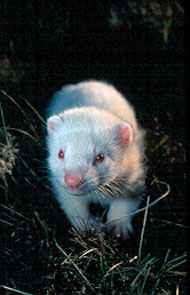
Cage
When purchasing an indoor cage or a cub (outdoor hutch) for your ferret you should consider the following:
Size
Opt for the largest size you can afford that will fit comfortably into your home/garden.
The minimum cub size for a pair of adult ferrets (males are called hobs and females jills) is 150cm long x 75cm wide x 75cm high. Coat cubs with a non-toxic weatherproof treatment.
Construction
Ferrets like to chew, so choose a cage made of solid wood or wire (depending on whether it is an indoor or outdoor cage).
If your ferret is to reside indoors, ensure that electric cables, holes etc are kept out of bounds!
The spacing between the bars of wire cages should be small enough to prevent your ferret from escaping.
Ensure that your ferret’s cage is free from dangerous protrusions that may cause injury.
Supply at least one nesting-box per ferret.
Feeding
Your ferret will require the following feed accessories:
A heavy earthenware or metal bowl to prevent him from tipping it over.
A gravity-feed water bottle to prevent contamination.
A bottle-brush to clean out his water bottle.
Twootz provides Premium Ferret Food and Small Animal fruity mix which are both ideal for your Ferrets well being.
Bedding
Suitable bedding materials include:
Wood shavings - ensure they are derived from untreated softwood (eg pine), as are usually sold in pet stores, otherwise your pet may suffer respiratory ailments and allergic reactions.
Hay - only use clean, fresh hay and remember to offer an additional daily source for eating.
Straw - use wheat or barley straw.
Shredded paper - ensure that it is free from ink in case your ferret chews it.
Blankets, sweaters etc - soft materials make cosy nests for ferrets.
Avoid sawdust as the fine particles may irritate your ferret's eyes and respiratory tract.
Toys and treats
Ferrets are highly intelligent animals and benefit from the mental and physical stimulation that toys and treats provide. Move playthings around his home to prevent him from becoming bored and remember that treats should be given in moderation to prevent obesity.
Suitable toys include:
Drainpipes – ensure they are large enough to prevent him from becoming stuck inside them.
Terracotta flowerpots – avoid plastic ones as they are chewable.
Deciduous tree branches – ferrets particularly enjoy apple tree branches.
Feed balls – fill with his favourite food/treats; they are dispensed when your ferret rolls them around.
Balls - ensure they are of solid and durable construction.
Paper sacks - ferrets love to rustle and play in these.
Suitable occasional treats include:
Canned and dry dog and cat food.
Baked wholemeal bread – a good chewing treat that helps maintain dental health.
Fresh meat - ensure that it is thoroughly cooked.
Fresh fruit and vegetables - hang them in your pet’s cage to make him work for his treat.
Grooming
Many ferrets will tolerate grooming if accustomed to it from an early age. You will require the following in your grooming kit:
A soft-bristled brush.
Round-ended scissors.
Nail clippers – ask your vet to demonstrate the correct way to trim your ferret’s claws before you attempt this task.
Ferret shampoo – bathing should be done no more frequently than once a month.
Toothbrush and toothpaste – cleaning your ferret’s teeth daily, with a brush and paste designed for cats, will help limit the amount of dental treatment he requires from your vet.


